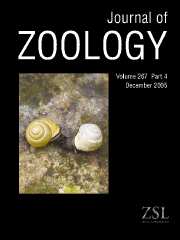Crossref Citations
This article has been cited by the following publications. This list is generated based on data provided by
Crossref.
Danell, Kjell
Bergström, Roger
Edenius, Lars
and
Ericsson, Göran
2003.
Ungulates as drivers of tree population dynamics at module and genet levels.
Forest Ecology and Management,
Vol. 181,
Issue. 1-2,
p.
67.
Cahill, Seán
Llimona, Francesc
and
Gràcia, Jordi
2003.
Spacing and nocturnal activity of wild boar Sus scrofa in a Mediterranean metropolitan park.
Wildlife Biology,
Vol. 9,
Issue. s1,
p.
3.
GEISSER, HANNES
REYER, HEINZ-ULRICH
and
Krausman
2004.
EFFICACY OF HUNTING, FEEDING, AND FENCING TO REDUCE CROP DAMAGE BY WILD BOARS.
Journal of Wildlife Management,
Vol. 68,
Issue. 4,
p.
939.
ACEVEDO‐WHITEHOUSE, KARINA
VICENTE, JOAQUÍN
GORTAZAR, CHRISTIAN
HÖFLE, URSULA
FERNÁNDEZ‐DE‐MERA, ISABEL G.
and
AMOS, WILLIAM
2005.
Genetic resistance to bovine tuberculosis in the Iberian wild boar.
Molecular Ecology,
Vol. 14,
Issue. 10,
p.
3209.
Royo, Alejandro A.
and
Carson, Walter P.
2005.
The herb community of a tropical forest in central Panamá: dynamics and impact of mammalian herbivores.
Oecologia,
Vol. 145,
Issue. 1,
p.
66.
Geisser, Hannes
and
Reyer, Heinz‐Ulrich
2005.
The influence of food and temperature on population density of wild boar Sus scrofa in the Thurgau (Switzerland).
Journal of Zoology,
Vol. 267,
Issue. 1,
p.
89.
Heinken, Thilo
Schmidt, Marcus
von Oheimb, Goddert
Kriebitzsch, Wolf-Ulrich
and
Ellenberg, Hermann
2006.
Soil seed banks near rubbing trees indicate dispersal of plant species into forests by wild boar.
Basic and Applied Ecology,
Vol. 7,
Issue. 1,
p.
31.
Acevedo, Pelayo
Escudero, Marco A.
Muńoz, Rosa
and
Gortázar, Christian
2006.
Factors affecting wild boar abundance across an environmental gradient in Spain.
Acta Theriologica,
Vol. 51,
Issue. 3,
p.
327.
Butler, David R.
2006.
Human-induced changes in animal populations and distributions, and the subsequent effects on fluvial systems.
Geomorphology,
Vol. 79,
Issue. 3-4,
p.
448.
SCANDURA, M.
IACOLINA, L.
CRESTANELLO, B.
PECCHIOLI, E.
DI BENEDETTO, M. F.
RUSSO, V.
DAVOLI, R.
APOLLONIO, M.
and
BERTORELLE, G.
2008.
Ancient vs. recent processes as factors shaping the genetic variation of the European wild boar: are the effects of the last glaciation still detectable?.
Molecular Ecology,
Vol. 17,
Issue. 7,
p.
1745.
Bueno, C. G.
Alados, C. L.
Gómez‐García, D.
Barrio, I. C.
and
García‐González, R.
2009.
Understanding the main factors in the extent and distribution of wild boar rooting on alpine grasslands.
Journal of Zoology,
Vol. 279,
Issue. 2,
p.
195.
Klimkowska, Agata
Bekker, Renée M.
Van Diggelen, Rudy
and
Kotowski, Wiktor
2010.
Species trait shifts in vegetation and soil seed bank during fen degradation.
Plant Ecology,
Vol. 206,
Issue. 1,
p.
59.
Cuevas, María Fernanda
Novillo, Agustina
Campos, Claudia
Dacar, Maria Ana
and
Ojeda, Ricardo A.
2010.
Food habits and impact of rooting behaviour of the invasive wild boar, Sus scrofa, in a protected area of the Monte Desert, Argentina.
Journal of Arid Environments,
Vol. 74,
Issue. 11,
p.
1582.
Bueno, C. Guillermo
Barrio, Isabel C.
García-González, Ricardo
Alados, Concepción L.
and
Gómez-García, Daniel
2010.
Does wild boar rooting affect livestock grazing areas in alpine grasslands?.
European Journal of Wildlife Research,
Vol. 56,
Issue. 5,
p.
765.
Risch, Anita C.
Wirthner, Sven
Busse, Matt D.
Page-Dumroese, Deborah S.
and
Schütz, Martin
2010.
Grubbing by wild boars (Sus scrofa L.) and its impact on hardwood forest soil carbon dioxide emissions in Switzerland.
Oecologia,
Vol. 164,
Issue. 3,
p.
773.
Burmeier, Sandra
Eckstein, R. Lutz
Otte, Annette
and
Donath, Tobias W.
2011.
Spatially-restricted plant material application creates colonization initials for flood-meadow restoration.
Biological Conservation,
Vol. 144,
Issue. 1,
p.
212.
Schiaffini, Mauro I.
and
Vila, Alejandro R.
2012.
Habitat use of the wild boar,Sus scrofaLinnaeus 1758, in Los Alerces National Park, Argentina.
Studies on Neotropical Fauna and Environment,
Vol. 47,
Issue. 1,
p.
11.
Verheyen, Kris
Baeten, Lander
De Frenne, Pieter
Bernhardt‐Römermann, Markus
Brunet, Jörg
Cornelis, Johnny
Decocq, Guillaume
Dierschke, Hartmut
Eriksson, Ove
Hédl, Radim
Heinken, Thilo
Hermy, Martin
Hommel, Patrick
Kirby, Keith
Naaf, Tobias
Peterken, George
Petřík, Petr
Pfadenhauer, Jörg
Van Calster, Hans
Walther, Gian‐Reto
Wulf, Monika
and
Verstraeten, Gorik
2012.
Driving factors behind the eutrophication signal in understorey plant communities of deciduous temperate forests.
Journal of Ecology,
Vol. 100,
Issue. 2,
p.
352.
2012.
Applied Population and Community Ecology: The Case of Feral Pigs in Australia.
p.
155.
Barrios-Garcia, M. Noelia
and
Ballari, Sebastian A.
2012.
Impact of wild boar (Sus scrofa) in its introduced and native range: a review.
Biological Invasions,
Vol. 14,
Issue. 11,
p.
2283.


